We talked about our favourite memories and the future with the first employees and former directors of IRC.
Published on: 08/03/2019
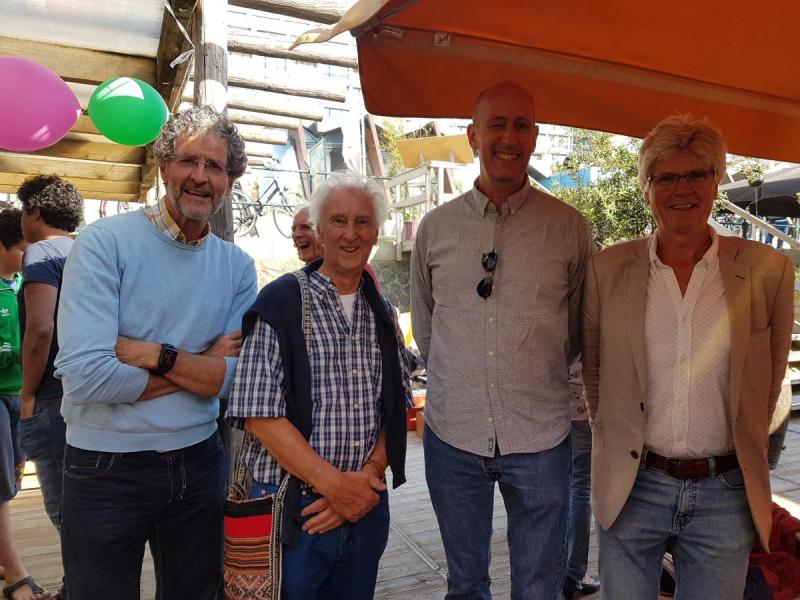
Hans van Damme (2nd from left) joined IRC in 1970, part-time, in charge of information and documentation. Loekie van der Sar joined as secretary in 1970. In 1981 Hans became the first director of IRC, when it became an independent foundation. Paul van Koppen (1st on the left) joined IRC in 2003 and was director until 2007. Nico Terra (1st from right) was IRC's director from 2009 until 2013, when Patrick Moriarty, IRC's current CEO took over.
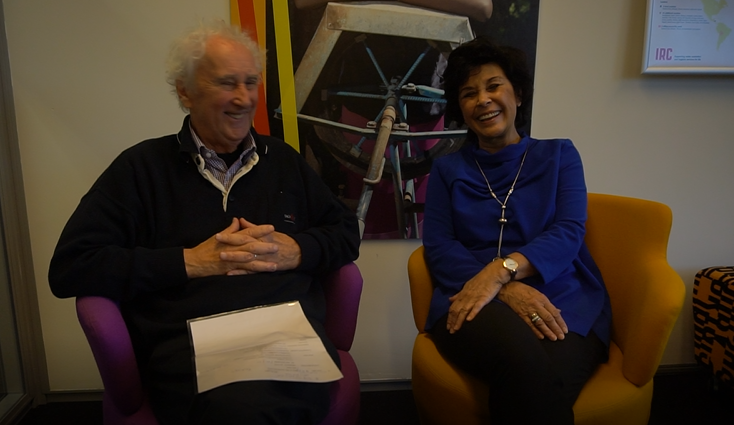
Hans and Loekie remember IRC's social gatherings
LvdS: We were working with a small team of people who were all very passionate about the organisation's objectives. There was an atmosphere of togetherness, with enough space for social gatherings [both LB and HvD laugh].
PvK: When I came to know IRC in 2003, it was a serious and relevant organisation. At that time focused on rural communities, and water supply and sanitation. I think in essence it is still a very serious and dedicated organisation.
NT: The enthusiasm and the commitment of IRC staff. From the first day that I came to IRC, you could clearly tell that people were very committed to the organisation's ambition.
HvD: The founding of IRC. At the end of the sixties there was quite some interest in water supply. So why create a central point for water supply in the Netherlands? After some deliberation at the World Health Organization (WHO), it became clear that the Netherlands had far better relations with most countries, than the United States. Also the Netherlands Institute for Drinking Water Supply (in Dutch RID = Rijksinstituut voor Drinkwatervoorziening) was entirely devoted to drinking water supply, and that didn't exist anywhere else in the world. So WHO prepared a contract with the Netherlands through the RID, and set aside a funding of US$ 10,000 a year. And that was that, IRC was established.
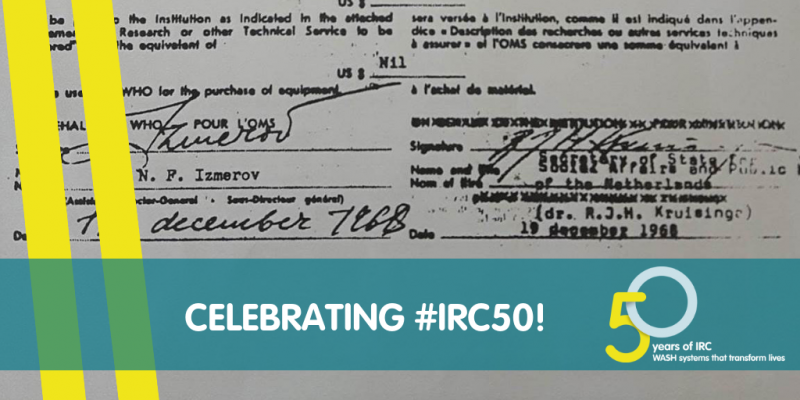
PvK: A seemingly small but important step for IRC was that we became an independent organisation in 2006. This gave us more flexibility but also brought in some more risks in terms of our security in funding. We also got some more consultancy assignments, one of them for the Bill and Melinda Gates Foundation. We mainly focused on developing the capacity of individuals and institutions at that time.
NT: I think IRC has gone through some great changes. When I entered IRC we were already working with country programmes, but we were very much managing them from The Hague. Then we started to move towards the countries having local staff, opening offices and having a local presence. And in the next phase recruiting local directors as members of the management team of IRC. This whole movement of moving beyond North to South support to rather an exchange of support has been very important.
LvdS: Well after a road trip in the United States, I came back and I had to decide what studies I would take up. I applied for an international job through an agency to bridge the summer gap and they proposed IRC to me. I liked what the institute was going to do and develop, and its objectives very much appealed to me so I decided to stay on. I stayed on for quite some time [laughs].
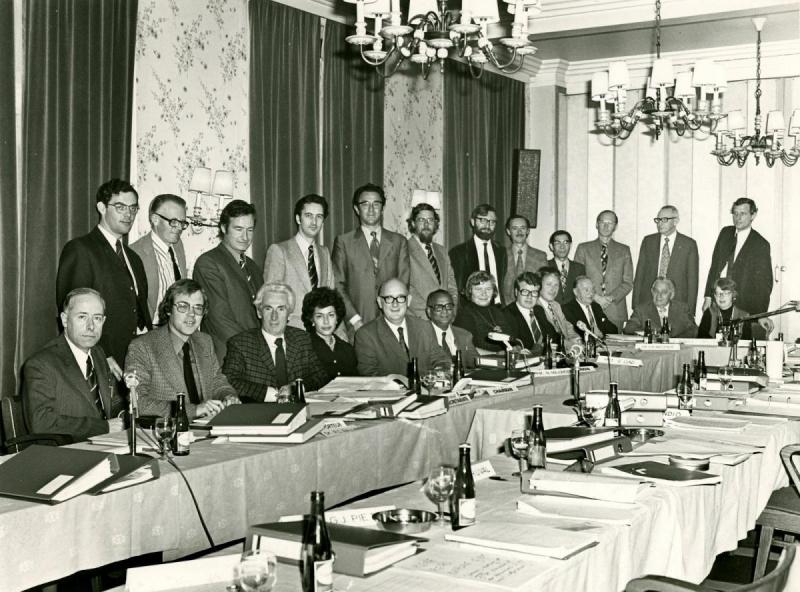
IRC meeting with collaborating institutions in 1970s. Hans van Damme, backrow, 4th from left
HvD: First of all it was the international scope. In the early days, we had an advisory board with members from the four United Nations (UN) agencies, working in water supply. Next to WHO, that was UNICEF, UNDP and the World Bank. All these agencies were interested in having our support. WHO at that time had a group of around 25 collaborating institutions and we were supposed to coordinate that. That wasn't as easy as it sounds, but at least that was the idea.
Second was that we didn't work much on infrastructure but we used it as a basis to develop more social approaches. That was very necessary because in many cases – UNICEF wrote a major paper about this – thousands of hand pumps where installed and within two years I believe, the majority was gone or broken down because their purpose was not clear in the local context. So we added education, empowerment and maintenance to traditional programmes. That made the difference internationally. UNICEF, for one, was very happy about that.
LvdS: What I very much liked in the first years is that we had personal contacts with people in the countries through our newsletter. This was the way in which we could communicate, in which we could retrieve information from the countries, and exchange this with other partners.
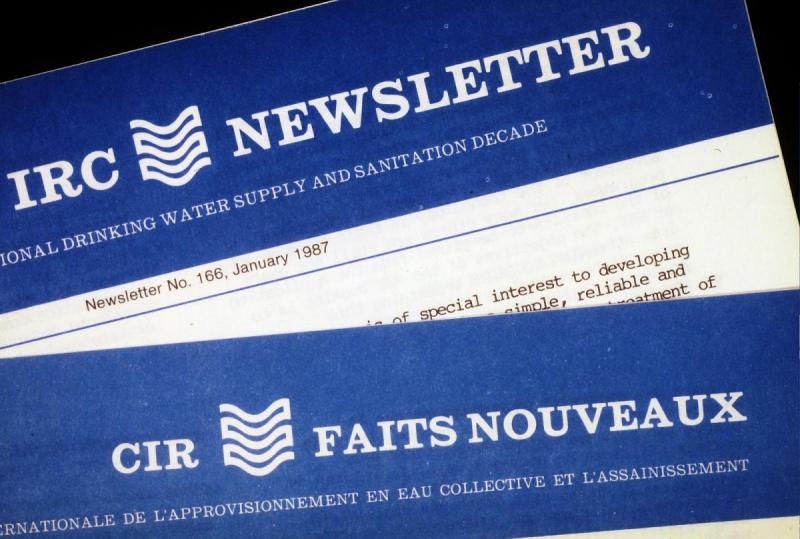
PvK: In Ghana, Burkina Faso, Nepal and Bangladesh, we really helped to build capacity on an individual basis but also on an organisational basis. I think we made a lot of good impact there.
Also, IRC is one of the most complete knowledge centres in terms of experience and expertise in the water, sanitation and hygiene sector, in terms of the SDGs, in terms of relevance and in terms of impact. I think IRC really has an extraordinary knowledge base compared to what else is available in the sector.
NT: IRC has contributed a lot to the thinking in the sector. Thinking in terms of service provision instead of a product or technology. Thinking in terms of full coverage in a smaller geographical area instead of scattered focus. Even if there is criticism sometimes, I believe IRC's work is very valuable.
PvK: What I like is that IRC is not afraid to take position in terms of stressing the need to engage governments. The systems approach and the need to look at services rather than facilities is also a good focus for the sector. So great if IRC keeps beating that drum.
NT: I think the biggest change in the sector has been that we are moving towards creating local water and sanitation services instead of giving money or giving technologies. We are providing supply training to entrepreneurs, and strengthening financial facilities to make a sector run on its own instead of remaining dependent on Northern technologies, expertise or funding. This change—to creating a sector locally, has been a very important step forward.
HvD: It is first of all to keep a bottom-up approach in mind, investing in people is important. And the social aspects of IRC's work should also be emphasised.
LvdS: That reminds me of an expression I heard from Bunker Roy, when I visited him in India: we don't need the money but the belief that we can do things. This explains it all, if you don't believe in what people can do and what there own powers are, then everything stops. Empowerment is very important.
PvK: What I like is the basic information services that IRC still provides: the website, the publications and last but not least, the newsletter. Every now and then, I am surprised and interested to read the articles, great sources for keeping track of what is happening.
In addition, I think it is good for IRC to remain critical about what is happening in the sector, what is happening in terms of policies by the United Nations, by government and other stakeholders. And it is also good for IRC to remain critical about its own way of operations, its own approaches, how to innovate in the way IRC operates and cooperates with others. When I started working at IRC in 2003, the organisation was not very engaged with the Dutch water sector. It was working in focused international areas. I think there is still a lot to gain from working with the water sector in the Netherlands.
NT: IRC is already moving towards a new way of working, moving activities and capacities to supporting the South instead of managing activities from The Hague. So we have a role in supporting, monitoring, evaluating and learning and maybe in fundraising coordination, but that the real implementation of programmes is done in the South. That we stimulate cooperation between countries so that South-South collaboration exists. I think IRC already plays and can continue to play a good role in that.
Interviews for this item were conducted by Cor Dietvorst, Dechan Dalrymple and Sára Bori.
At IRC we have strong opinions and we value honest and frank discussion, so you won't be surprised to hear that not all the opinions on this site represent our official policy.